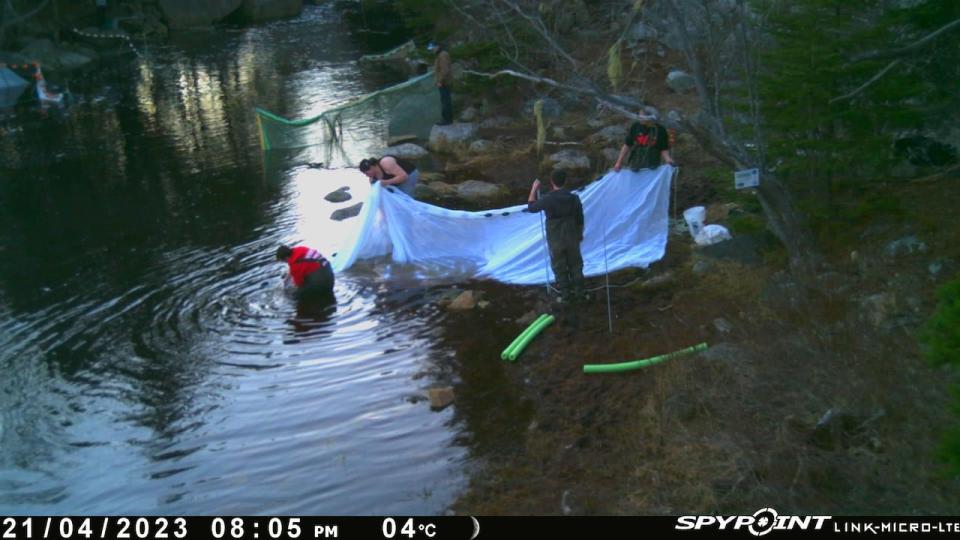DFO considers cuts to commercial elver quotas to boost First Nations access
Federal officials are considering handing over to First Nations a much greater portion of the lucrative but highly fraught Maritime fishery for baby eels by slashing the quotas of commercial outfits that have long held licences in the industry.
The potential move is outlined in a letter sent to licence holders this week by the Department of Fisheries and Oceans, which has grappled in recent years with widespread unauthorized elver fishing. In March, the department cancelled this year's spring season outright.
Indigenous groups are already allocated a portion of the fishery. The department is examining whether to bump that substantially to 50 per cent of annual total allowable catch, but without compensating commercial licence holders for quota that would shift to the First Nations.
"It's devastating," said Michel Samson, a lawyer for commercial licence holder Wine Harbour Fisheries.
"This is something that's never been done in other fisheries, and why DFO is adamant of continuing to take away quota from licence holders who built this fishery over 30 years without compensation just simply doesn't make sense."
Elvers, which are tiny juvenile eels, are caught using nets during the spring along Nova Scotia and New Brunswick rivers, and then shipped live to Asia where they are raised to adulthood for food. Increasing demand has led to skyrocketing prices in recent years, and a surge in poaching and threats.

This year, despite shutting down the season before it even started, unauthorized fishing has continued. DFO said its enforcement officers have made 169 arrests, and seized hundreds of nets, more than two dozen vehicles and nearly 400 kilograms of elvers.
Those arrested have included Mi'kmaw fishermen, some of whom have claimed a treaty right to fish for elvers outside of DFO regulations.
The Assembly of Nova Scotia Mi'kmaw Chiefs said in a statement Wednesday that it learned of DFO's proposal this week and that it was "unexpected." The assembly said that while increasing participation in the elver fishery is a treaty communal right, DFO's plans need to be examined.
"We want to assure our communities that we understand the cultural significance of eel to our people and the importance of the elver fishery as a significant economic contributor," the statement said.
Chief Allan Polchies, of St. Mary's First Nation in New Brunswick, said in a statement the Wolastoqey Nation is "surprised and optimistic" about DFO's proposal and wants to work toward a well-managed fishery.
Conservation questions
In the letter to licence holders, DFO said the quota redistribution would "increase First Nations participation in the elver fishery and support fishing in pursuit of a moderate livelihood," a nod to the term used in the 1999 Supreme Court of Canada Marshall decision on First Nations fishing rights in the Maritimes.
The department also indicated it could open the door to new commercial entrants into the elver fishery, a move that would further squeeze the longstanding licence holders.
DFO would not grant an interview Wednesday.
There are concerns about the conservation of the American eel and DFO has resisted raising the annual total allowable catch for elvers, which sits at 9,960 kilograms. In 2012, there was a recommendation to list American eel as a species at risk in Canada, but there's been no decision on whether to do so.
Some Mi'kmaw elders, whose communities have traditionally fished for adult eels as a source of food, have also worried that the rush to cash in on elvers is harming populations.
Stanley King, a commercial elver holder, said he believes evidence shows the population is healthy, and a decision should be made not to list it as at risk, allowing the total catch to be increased and creating room for more players.
Licence holders are in favour of increasing First Nations access, he said, and are willing to sell their licences to DFO so those quotas can be dedicated to Indigenous groups. But he said the federal government's attempts at reconciliation through the "expropriation" of quotas is only leading to hardship and "bad feelings."
Colin Sproul, the president of the United Fisheries Conservation Alliance, a group of multi-species independent fishermen and fishing associations, said the federal government has a duty to fulfill the rights outlined in the Marshall case.
But he said there's also an obligation to ensure a "peaceful transition," and it's hard to understand how taking away quota without compensation will help with that.
"I think it's completely outrageous, it's unfair and un-Canadian and borderline illegal," he said.
MORE TOP STORIES


